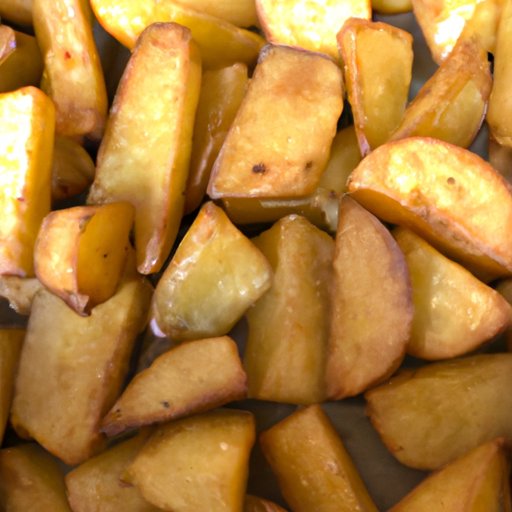Introduction
Home fries are a beloved breakfast side dish that is popular around the world. They are typically made with potatoes that have been diced or shredded and cooked with onions, garlic, and other seasonings. Home fries are often served as part of a hearty breakfast plate alongside eggs, bacon, and toast. But are home fries really healthy? This article will explore the nutritional value and health benefits of home fries to help answer this question.

Analyzing the Nutritional Value of Home Fries
Potatoes are a nutrient-rich food and provide a variety of essential vitamins and minerals. One medium potato contains 110 calories, 2.3 grams of protein, 0.2 grams of fat, 26 grams of carbohydrates, 3.8 grams of dietary fiber, and 16% of the daily value for potassium. In addition, potatoes are an excellent source of vitamin C, magnesium, phosphorus, and iron.
When making home fries, it is important to note that the nutritional value can vary depending on the ingredients used. For example, if butter or oil is added during cooking, the fat content will increase. Similarly, if additional seasonings and cheese are added, the sodium content will also increase.
Exploring the Health Benefits of Home Fries
In addition to providing essential vitamins and minerals, home fries offer numerous health benefits. Here are a few:
Heart Health
Potatoes are high in potassium, which helps to regulate blood pressure and reduce the risk of stroke and heart disease. Potassium also helps to maintain normal fluid balance in the body, which is beneficial for heart health.
Digestive Health
The dietary fiber in potatoes helps to promote regularity and reduce the risk of constipation. Fiber also helps to keep the digestive system healthy by feeding the beneficial bacteria in the gut.
Weight Management
Potatoes are low in calories and high in fiber, which makes them an ideal choice for weight management. The fiber helps to keep you feeling full longer, so you’re less likely to overeat. Additionally, potatoes contain resistant starch, which has been shown to aid in weight loss.

Comparing Home Fries to Other Potato Dishes
When considering the healthiness of home fries, it is important to compare them to other potato dishes. Here is a quick comparison between home fries, French fries, mashed potatoes, and baked potatoes:
French Fries
French fries are deep-fried, which significantly increases their fat and calorie content. Additionally, the high heat used to cook French fries destroys many of the beneficial nutrients found in potatoes. For these reasons, French fries are not considered a healthy option.
Mashed Potatoes
Mashed potatoes are typically made with butter, cream, and salt, which adds extra calories and saturated fat. However, if prepared without these additions, mashed potatoes can be a nutritious side dish.
Baked Potatoes
Baked potatoes are a healthy option because they are cooked without added fat. They are high in fiber, vitamins, and minerals, and make a great base for a nutritious meal. Just be sure to top them with healthy ingredients, such as vegetables and lean proteins.

Examining the Role of Home Fries in a Balanced Diet
Home fries can be part of a balanced diet, but it is important to consider your individual dietary needs. If you are trying to lose weight, limiting your intake of fried foods is recommended. Additionally, pairing home fries with a lean protein, such as eggs or chicken, and including a serving of vegetables can help to create a more balanced meal.
It is also important to consider any dietary restrictions you may have. For those who follow a vegan or vegetarian diet, home fries can be a good source of plant-based protein. And for those with diabetes, it is important to monitor your carbohydrate intake and choose healthier toppings, such as non-starchy vegetables.
Investigating How Home Fries Impact Blood Sugar Levels
The glycemic index (GI) is a measure of how quickly a food raises blood sugar levels. Foods with a high GI score raise blood sugar rapidly, while foods with a low GI score raise blood sugar slowly. Potatoes have a moderate GI score, ranging from 56-111 depending on how they are prepared.
In addition to the GI score, the glycemic load (GL) should also be considered. The GL is a measure of the amount of carbohydrates in a food and how quickly they are absorbed into the bloodstream. Potatoes have a moderate GL score, ranging from 4-24.
Conclusion
In conclusion, home fries can be part of a healthy diet. They are a good source of essential vitamins and minerals and offer numerous health benefits, such as heart health, digestive health, and weight management. When preparing home fries, it is important to consider the ingredients used and pay attention to portion sizes. Additionally, it is important to pair home fries with lean proteins and vegetables to create a balanced meal. Finally, be aware of how home fries impact blood sugar levels and consider the glycemic index and glycemic load when deciding how much to eat.
(Note: Is this article not meeting your expectations? Do you have knowledge or insights to share? Unlock new opportunities and expand your reach by joining our authors team. Click Registration to join us and share your expertise with our readers.)
